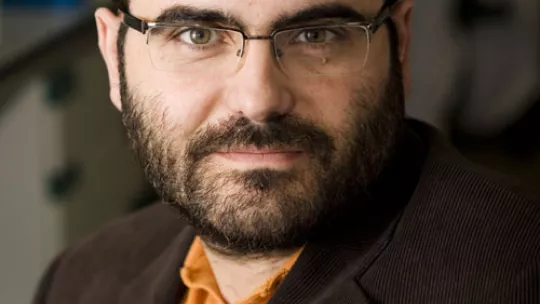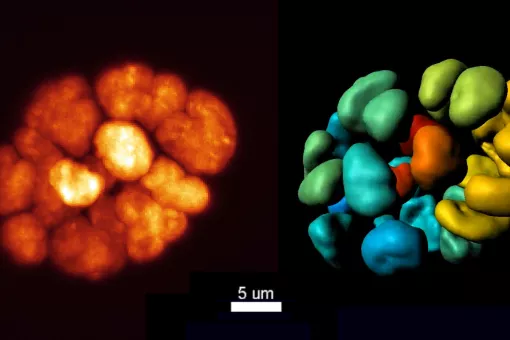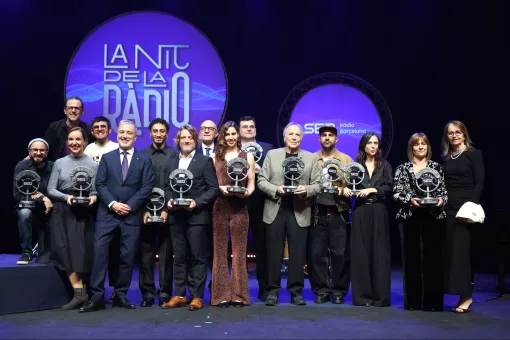Images
Dr Eduard Batlle and Dr Joan Seoane recognized through the Dr. Josef Steiner Cancer Research Award 2013 for their research into colon cancer and brain cancer respectively.
The 2013 Award celebrates cancer research of excellence in Barcelona.
Eduard Batlle, ICREA Professor, Oncology Programme Coordinator and principal investigator of the Colorectal Cancer Laboratory at the Institute for Research in Biomedicine (IRB) and Joan Seoane, ICREA Professor, Director of Translational Research at the Vall d’Hebron Institute of Oncology (VHIO) and Principal Investigator of the Gene Expression and Cancer Group, have won the Dr. Josef Steiner Cancer Research Award 2013 for their dedicated work in oncology.
Consisting of a €400,000 grant each to fuel a research project over a four-year period, as well as a personal prize for each researcher in recognition of their outstanding professional development to-date, both researchers will receive the shared award at a special ceremony taking place today at the University of Bern (Switzerland).
The Dr. Josef Steiner Foundation supports research into the mechanisms that trigger cancer and the development of more effective diagnostic tools and treatments to fight this disease. The aims of the Foundation include honouring studies and researchers that develop new concepts and diagnostic or therapeutic approaches, and raise public awareness on and around the importance of preclinical research as the first essential element upon which to build translational studies.
“It is a true honour for us both to receive this award, especially given the exceptional and incomparable standing of previous awardees including the internationally acclaimed David Lane, Arnold Levine, Judah Folkman, and the Nobel Prize Paul Nurse, to name but a few”, explain Dr. Seoane and Dr. Batlle. "This recognition is very positive for cancer research and recognizes Barcelona as an epicentre for cancer research of excellence with many internationally renowned groups and institutes”, they affirm.
Eduard Batlle: Deciphering the mechanisms responsible for metastasis of colorectal tumors
Colorectal cancer is one of the main causes of cancer-related deaths worldwide. The majority of patients succumb to the disease due to its spreading to other organs. Currently it is not possible to identify patients at risk for developing metastasis and today´s therapies are ineffective in blocking metastatic spread. Dr. Batlle´s laboratory pioneered the identification of a population of malignant cells capable of spreading the cancer to the liver and lungs, the organs in which metastasis most frequently occurs in patients with colon cancer.
“These tumor cells have copied and subverted mechanisms used by normal tissue stem cells and can self-renew uncontrollably. They are cancer stem cells. In addition, these cells are resistant to current drugs and hence are responsible for recurrence of the disease post-treatment”, comments Batlle. “We have recently discovered that a key feature of this cell type is its ability to communicate and transform the environment to provide them with growth and survival factors during colonization of the liver and the lungs.”
This research opens avenues for the development of new therapeutic strategies to block metastasis. In addition, Batlle, in collaboration with the Botín Foundation, is currently translating his research findings to the clinic through a project called Colostage, a test that will identify colon cancer patients that are at high risk of developing metastasis further to treatment.
Brief profile:
Eduard Batlle (Barcelona, 1970), received a doctorate in biology from the University of Barcelona. His first postdoctoral position was at the Institut für Molekularbiologie und Tumorforschung, in Marburg, Germany, and then he spent four years at the Netherlands Institute for Developmental Biology, in Utrecht, The Netherlands, under the mentorship of the renowned scientist Hans Clevers. His work has been published in the best biomedical journals including several articles in Nature journals and deserving two covers in Cell and Cancer Cell.
Some of the discoveries made by Eduard Batlle have founded new fields of research and his publications have a high impact in the scientific community reflected by the citations and comments they have received in leading scientific journals. In 2006, Dr Batlle received the Debiopharm Life Sciences Award for Outstanding Research in Oncology from the École Polytechnique Fédérale de Lausanne (EPFL) in Switzerland and the Banc Sabadell Biomedical Research Award (2010).
Since 2005, Eduard Batlle coordinates the Oncology Programme and directs the Colorectal Cancer Laboratory Group at IRB Barcelona. Batlle received the prestigious European Research Council (ERC) Starting Grant and more recently an ERC Advanced Grant to pursue his research into intestinal stem cells and colon cancer.
About IRB Barcelona
The Institute for Research in Biomedicine (IRB Barcelona) pursues a society free of disease. To this end, it conducts multidisciplinary research of excellence to cure cancer and other diseases linked to ageing. It establishes technology transfer agreements with the pharmaceutical industry and major hospitals to bring research results closer to society, and organises a range of science outreach activities to engage the public in an open dialogue. IRB Barcelona is an international centre that hosts 400 researchers and more than 30 nationalities. Recognised as a Severo Ochoa Centre of Excellence since 2011, IRB Barcelona is a CERCA centre and member of the Barcelona Institute of Science and Technology (BIST).





